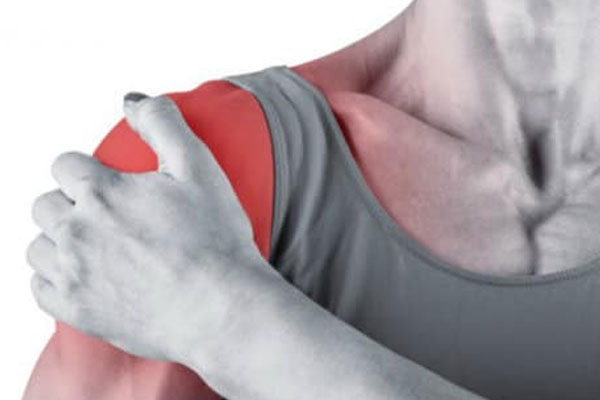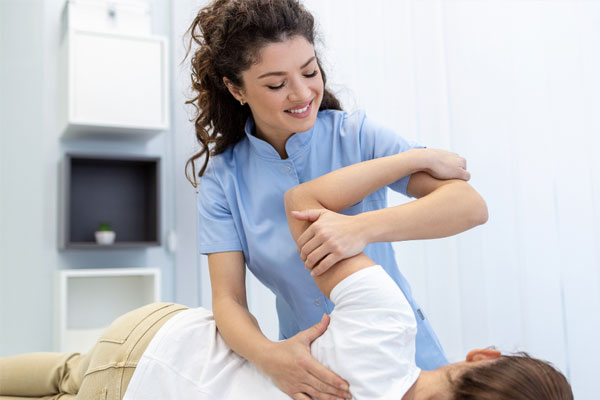Complete Rotator Cuff Treatment in Jaipur
Your shoulder's functionality can be severely impaired by rotator cuff injuries, resulting in pain thereby constraining your ability to perform your routine tasks & activities. Dr. Vikram Sharma at Sportsmed Hospital, specializes in comprehensive and efficient Rotator Cuff Treatment in Jaipur. Our personalized treatment plans are designed to address any level of discomfort you may feel as well as intense pains so that you regain mobility in your shoulder joint and improve the quality of your life.


Recognizing the Symptoms of Rotator Cuff Injuries
In most cases, symptoms of rotator cuff injuries include persistent shoulder pain especially when lifting or rotating the arm. Other indicators are shoulder weakness, difficulty sleeping on the affected side, and limited motion range. These signs should prompt you to see a doctor to avoid worsening the situation further, by getting timely medication.
Understanding the Causes of Rotator Cuff Injuries
Rotator cuff injuries can result from various causes such as acute trauma or injury to the shoulder, repetitive overhead activities, and heavy lifting among others. Moreover, degenerative changes due to the aging process together with sudden falls or accidents affecting the shoulder can lead to these types of injuries. Understanding these factors aids in developing effective preventive measures as well as treatments for the same.
Identifying the Risks Associated with Rotator Cuff Injuries
Aging is one of the factors that contribute to rotator cuff injuries and the risk increases after 40 years of age; also, the nature of sports contributes to Rotator Cuff Injury, for instance certain sports like Baseball and Tennis involves Repetitive arm movements. Other factors that increase the likelihood of rotator cuff injuries are occupational hazards such as jobs requiring repeated arm movements; and genetic predisposition.
Accurate Diagnosis of Rotator Cuff Injuries
Proper diagnosis is important to treat it effectively. The process begins with a comprehensive medical history and physical examination which includes assessments for bone deformities, usefulness of muscles, and tendon modifications. Many tests such as X-rays or MRI scans can be used to determine how deep the injury penetrates. Functional assessments examine shoulder motion and power to have a full understanding of the extent of an injury.
Effective Treatment Options for Rotator Cuff Injuries
Treatment options for rotator cuff injuries depend on their severity. Initial management typically involves rest, activity modification, and the use of pain relief medications like NSAIDS among others. Physical therapy is essential for strengthening muscles and increasing flexibility. More severe cases may require corticosteroid injections or surgical options like arthroscopic tendon repair or shoulder replacement. may be necessary.
Why Choose Dr. Vikram Sharma for Rotator Cuff Treatment in Jaipur?
Dr. Vikram Sharma is a well-known arthroscopic specialist with years of experience in handling Rotator Cuff Injuries. At SportsMed, we offer personalized care based on individual needs, advanced diagnosis and therapy methods as well as comprehensive rehab programs to ensure you make complete recovery. Get superior care and effective rotator cuff treatment in Jaipur.
Additional Tips for Managing Rotator Cuff Injuries
Cold and Heat Therapy: Applying ice packs can reduce inflammation, while heat packs can soothe stiff muscles.
Lifestyle Modifications: Adjust daily activities to avoid putting stress on your shoulders. Regular Monitoring: Regular follow-ups with your doctor to monitor progress and adjust treatments as necessary.
For expert rotator cuff treatment in Jaipur, book an appointment with Dr. Vikram Sharma at SportMed – Sports Injury Clinic. Let us help you achieve a pain-free and fully functional Shoulder.
FAQs About Rotator Cuff Treatment in Jaipur
Non-surgical treatments include rest, physical therapy, medications, and corticosteroid injections to manage pain and inflammation.
Surgery is considered when non-surgical treatments fail to relieve symptoms or in cases of severe tendon tears.
Several months of rest combined with physical therapy and a gradual return to activities may be needed before one can feel a full recovery.
Prevention measures involve regular exercises that strengthen your shoulder muscles keeping off repeated overhead actions while maintaining good form when playing games or taking part in other sports and not lifting weights that are too heavy when you are not in shape.
